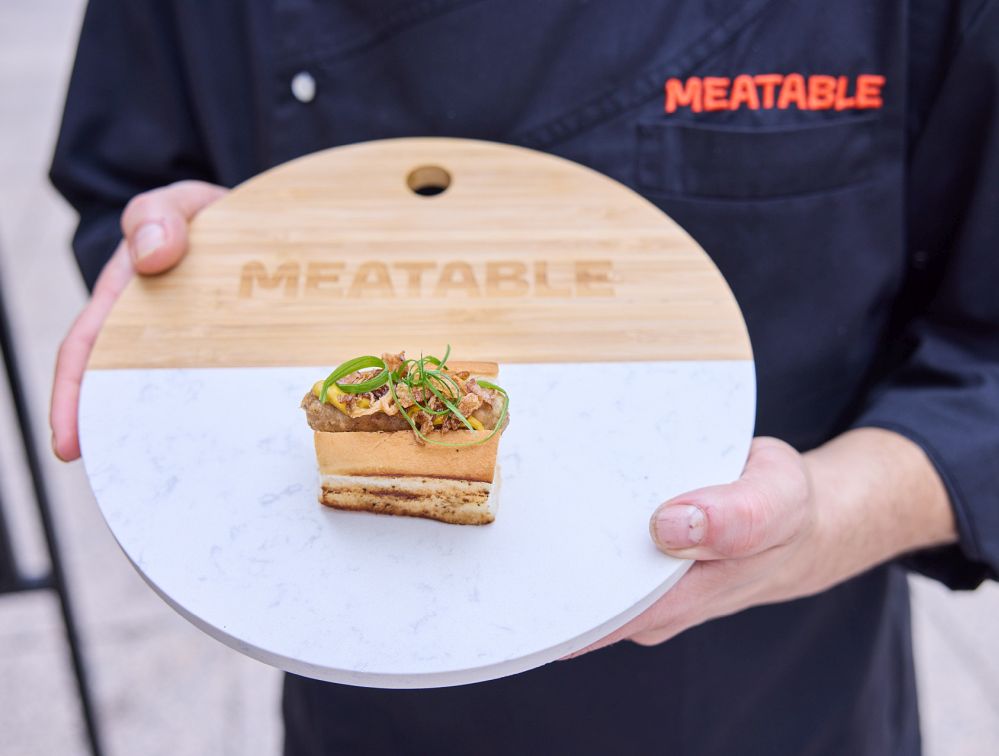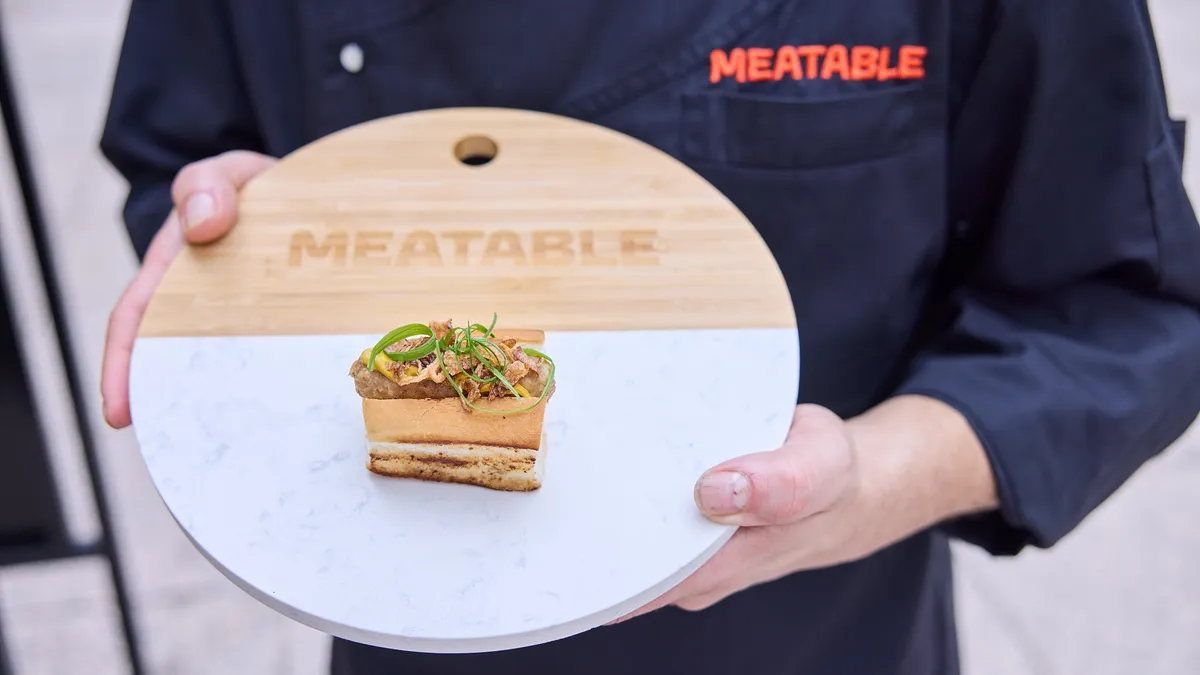Cultivated meat may be down, but it’s not out, insists the new US-based CEO of Dutch startup Meatable. The reason is simple, claims Jeff “Trip” Tripician, a meat industry veteran who took the helm of the company last month. “Our supply chain as it stands is not able to feed 8 billion people without destroying the environment.”
And large food and meat companies—who will ultimately fund the scale up of this technology, predicts Tripician—know this better than anyone.
“They know that in the next couple of years, they can invest in organic and grass-fed and regenerative and free-range and they can charge more for these products and make a return. But they also know that these solutions are only so scalable; they take more land and the animals grow more slowly and they’re more expensive to feed. They’re not as efficient. At some point, they are going to have to ask: what’s next?”
He adds: “Cultivated meat and seafood can be made to order, it doesn’t have the issues with land, water, disease… avian flu, swine flu, animal welfare, antibiotics… it can address the issues that consumers care about and have already shown they will pay extra for, so if we can do it efficiently, why wouldn’t people buy it?”
‘We are a raw material supplier, as unsexy as that is’
As for cultivated meat startups—several of whom announced ambitious scaleup plans before their technology was ready for prime time—we’re not going back to 2021 when money was cheap and firms were banking on using VC money to fund large-scale commercial facilities in-house, he says.
“Unfortunately for them, they made a decision that I think was fatal,” adds Tripician, who succeeds Meatable cofounder Krijn de Nood as CEO (de Nood will continue to serve on the board). “They said, ‘I’ll take a limited investment, I’ll invest it in brick and mortar, and I’ll hope that I can create a product with my name on it and do that in time to not run out of money and fill a plant.’
“Our business model is 180 degrees the opposite of that. We are a raw material supplier, as unsexy as that is, a raw material supplier or vendor to a meat company.
“The companies that will win will have the best science, and they will partner with established [meat] companies that will build the large-scale plants,” adds Tripician, who has extensive experience in the US meat market in general management, marketing, fundraising and M&A and has worked with brands including Grass Fed Foods, Niman Ranch, Coleman Natural, and Sioux- Preme. He is also supported by new board member Dean Banks, former president and CEO of Tyson Foods.
“Meat companies will have this be part of their capex plan for decades, most likely incremental standalone, cultivated meat plants.”

January 2025 open house
According to Tripician: “A key date for us is February 2025, when we’re going to invite interested parties to come to our pilot plant in Leiden and see what we’re able to do with the technology and taste the products.”
While Meatable plans to test market products in Singapore later this year pending regulatory approvals, it is not planning to waste money on extensive commercial sales with loss-making technology, he said. “The point of each test is to learn something. It will be a case of, we’ve made some advances [in the process or products]. Let’s test them. It might be several times a year.
“At some point, the day will arrive when our partners will say, ‘Look at the costs of goods, look at the efficiency, we think it’s close enough to where we want to be that we should break ground [on a commercial facility].’ But before that I expect we’ll have already done a licensing deal as they won’t want their competitors to have this [technology].”
But it can’t be rushed, he says. “You should move quickly when you have the right technology, not because you’re worried about funding.”
That said, Meatable has already seen a dramatic decline in the cost of goods such that “We can see how we can get to a point where the price per pound is the equivalent of organic and other premium meat products in the marketplace,” he claimed.
Hype, stagnation, consolidation, redirection…
Meatable has slashed production times for cultivated pork in recent months by dramatically speeding up the process by which its stem cells differentiate into fat and muscle, further improving its unit economics at a time when the industry is facing intense scrutiny.
Speaking to AgFunderNews in March, cofounder and CTO Daan Luining acknowledged it was a challenging time for the cultivated meat industry with investment plunging last year, but noted that Meatable had secured the largest round ($35m series B) in the sector in 2023, taking its total funding to just under $100 million.
“I think what we’re seeing is a natural cycle for all innovation, where you see hype, then stagnation, then consolidation, and then redirection,” said Luining, a biologist who cofounded Meatable in 2018 with stem cell biologist Dr. Mark Kotter and McKinsey exec Krijn de Nood. “But the companies with something unique and of value will stay because they have something worth investing in.
“A lot of companies just got in with the idea that they could take off-the-shelf stuff without true innovation and then build the train tracks while the train was running. Maybe you can make it work if you find something of value during the ride, but we started with a unique technology and that has allowed us to make progress without succumbing to hype and trying not to oversell anything.”
Opti-Ox technology: ‘This is really a breakthrough in stem cell biology’
Rather than “re-programming” or inducing adult cells to get them to behave like embryonic stem cells (which can differentiate into any cell type), Meatable is extracting pluripotent stem cells from animals’ umbilical cords. These cells have certain advantages including rapid division and versatility (they can differentiate or transform into multiple different cell types such as fat or muscle), said Luining.
“You don’t need fetal bovine serum since their innate program for growth is already on. They grow suspension without microcarriers, and they are very sturdy when it comes to large scale expansion.”
However, Meatable’s secret sauce is its ability to understand the internal machinery within the cells that triggers them to develop into different cell types by deploying patented Opti-Ox technology developed by cofounder Dr. Mark Kotter. This activates transcription factors (combinations of which encode the identity of cells) with a precision “rarely seen in biology,” enabling Meatable to both precisely control and dramatically speed up the differentiation process, said Luining.
“We’re using cells’ natural ability to turn into muscle or fat by pressing the buttons that turn them into muscle or fat. This is really a breakthrough in stem cell biology. We went from 45 days to 21, then eight, and now four days [to differentiate pluripotent stem cells into muscle and fat cells]. Doing it this fast is ultimately what makes our cultivated meat production process economically viable.”
Continuous perfusion process
Meatable operates a continuous perfusion process, he explained: “So we have one bioreactor for cell production and then we siphon off cells every day because they double every 16 to 24 hours. So if you have a 100% full bioreactor, the next 24 hours you’ll have another 100% full bioreactor, so you siphon off 100% of the volume of cells into a second phase [bioreactor] where you start the differentiation process [which requires different media].
“The faster you can do that, the fewer second-stage bioreactors you need, and the less time the cells spend in that bioreactor where you have to feed them nutrients and growth factors and heat. So there’s less CapEx on bioreactors and less OpEx [labor, energy, water etc] on the maintenance of the cells in the bioreactor. Perfusion creates extra complexity but it’s worth it.
“Right now we’re looking at stir tanks [where the contents of the bioreactor are agitated by propellers to ensure even distribution of oxygen and nutrients throughout] up until a certain size of roughly around 10,000-liters and then we’re trying to determine do larger stir tank reactors still support cell growth for the future?”
He added: “The other thing to consider is how many cells per milliliter your bioreactor supports because if you have a 10,000-liter reactor with only three cells grow in it, it’s useless. But if you have a 5,000-liter reactor and a gazillion cells, that’s another matter. We’ve done extensive lifecycle analyses, and with the densities that we’re reaching now, when we translate that to 10,000 liters, there’s where we start to become economically profitable.”
‘Differentiation is going to be critically important’
While Meatable is not making structured products such as beef steak or pork chops or deploying a tissue engineering approach for its first products, the cells it harvests are fully differentiated, which is important from a nutritional perspective, said Luining.
“Some players use undifferentiated cells, but if you don’t differentiate you can’t really recreate the experience of meat. Don’t get me wrong; we’re not making a steak [with fully-fledged muscle tissue] but we are making high quality fat and muscle. There are unique characteristics of the compounds that [fully differentiated] cells make that are delicious and nutritious. But you have to be able to do it with the efficiency and speed that makes it cost-effective.”


